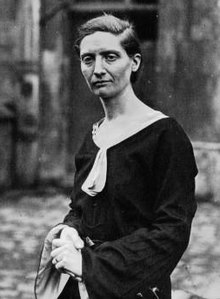Rose Celli
Rose Celli | |
|---|---|
 Celli, 1933 | |
| Born | Rose Angéline Alexandrine Brua 1895 Philippeville, Algeria |
| Died | 1982 (aged 86–87) Saint Paul de Vence, France |
| Occupation |
|
| Genre |
|
| Spouse | Elmiro Celli |
Rose Angéline Alexandrine Celli (née Brua; 1895–1982) was a French novelist, playwright, translator and poet. She wrote children's books, poetry and novels for adults, and is best known for her children's books published as part of the Père Castor series.
Early life and education[edit]
Celli was born in Philippeville, Algeria, in March 1985.[1] Her father was of Alsatian heritage and her mother was Corsican.[2][3] She spent four years at secondary school in Philippeville, after which she moved to France and attended a preparatory course at a high school in Versailles.[2]
She subsequently entered the École normale supérieure de jeunes filles, intending to become a teacher.[2] She was a classmate of Suzanne Febvre, the wife of Lucien Febvre. Celli did not graduate, however, due to a disagreement with the school's administration. She was later paid to undertake copy-editing of Lucien Febvre's Encyclopédie française.[4] Around the time of leaving the École she married the painter Elmiro Celli (1870–1958).[5][6]
Literary career[edit]
In 1929 Celli received the Prix de la Liberté literary award for her fantasy story Le Bateau de Pierre.[5][7] She had entered this competition on the encouragement of a fellow student at the École.[2] Her first novel, Comme l'eau, was published by Editions du Tambourin in 1930,[8] and it was followed by the collection of short stories published by Flammarion in 1931, Le chale indien.[2][9] A copy of the latter is held in the Princeton University Rare Books Collection, and is hand-dedicated to Sylvia Beach.[4] She also wrote poetry; some of her poems were published in the magazine Europe.[9][6]
In 1932 she was one of the first authors to contribute to the Père Castor children's book series, published by Flammarion.[10] Her works for this series included animal stories, a version of Goldilocks and the Three Bears, and a story about Baba Yaga, illustrated by Nathalie Parain.[2][9][6] Baba Yaga was translated into English and published in the United States in 1935.[11]
Also in 1932, Celli's first play, L'enfant Voilé premiered at the Albert Theatre in Paris, in three acts. It was performed by the theatre group L'Exposition d'Art Dramatique[7][2][6] A review in La Liberté newspaper described it as similar in style to the work of Henrik Ibsen.[7]
In 1933 Celli received the Prix Minerva award for her novel Isola,[12] a historical work set in the Corsican mountains.[2] The award came with a prize of 5,000 francs.[13] Her 1935 book L'envers du tapis featured stories of her childhood growing up in Algeria.[3] In later years, Celli translated a number of English works into French under the name R Brua, including a translation of Not So Quiet by Evadne Price (written as Helen Zenna Smith) and The Fun of It by Amelia Earhart.[2][6]
Celli died in 1982 in Saint Paul de Vence.[6]
References[edit]
- ^ "Algérie PHILIPPEVILLE 1895". Archives nationales d'outre-mer (in French). Retrieved 19 March 2024.
- ^ a b c d e f g h i "Rose Celli". L'Écho d'Alger (in French). 9 April 1935. Retrieved 19 March 2024.
- ^ a b "Les Livres". Le Matin (in French). No. 18, 868. 17 November 1935. p. 4. Retrieved 19 March 2024.
- ^ a b Davis, Natalie Zemon (1992). "Women and the World of the Annales" (PDF). History Workshop Journal (33): 123–131. Retrieved 18 March 2024.
- ^ a b Tery, Simone (22 June 1929). "Autor d'un prix litteraire: Rose Celli". Les Nouvelles littéraires, artistiques et scientifiques (in French). p. 10. Retrieved 18 March 2024.
- ^ a b c d e f Dussert, Eric (March 2018). "La Rose de Philippeville". Le Matricule des Anges (in French). Retrieved 19 March 2024.
- ^ a b c "La première pièce de Rose Celli". La Liberté (in French). 14 April 1932. p. 2. Retrieved 18 March 2024.
- ^ "Comme L'eau". Le Petit Parisien (in French). 17 October 1930. p. 2. Retrieved 19 March 2024.
- ^ a b c Ratel, Simonne (7 May 1933). "Rose Celli". La Femme de France (in French). p. 13. Retrieved 19 March 2024.
- ^ Conrad, JoAnn (December 2019). "Modernity and Modernism in Twentieth-Century American Picturebooks". International Research in Children's Literature. 12 (2). Retrieved 19 March 2024.
- ^ Lévêque, Mathilde (2017). "Quand les souris dînent au clair de lune et que les chats font des chiens : réflexions sur le statut de l'œuvre originale dans quelques albums traduits pour la jeunesse". Traduction et transfiguration: voir, lire, traduire (in French) (22). doi:10.4000/trans.1706. Retrieved 19 March 2024.
- ^ Brandt, Joseph A. (January 1934). "Literary Landmarks of 1933". Books Abroad. 8 (1): 31. Retrieved 18 March 2024.
- ^ "Mme Rose Celli désignée par le jury de « Minerva »". Le Peuple (in French). 22 March 1933. p. 2. Retrieved 19 March 2024.
- 1895 births
- 1982 deaths
- People from Philippeville
- French people of Corsican descent
- 20th-century French women writers
- 20th-century French novelists
- French women novelists
- 20th-century French poets
- French women poets
- 20th-century French dramatists and playwrights
- French women dramatists and playwrights
- French children's writers
- French women children's writers
- 20th-century French translators
- English–French translators
